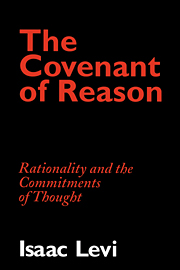Book contents
- Frontmatter
- Contents
- Introduction
- 1 Rationality and commitment
- 2 Rationality, prediction, and autonomous choice
- 3 The logic of full belief
- 4 Consequentialism and sequential choice
- 5 Prediction, deliberation, and correlated equilibrium
- 6 On indeterminate probabilities
- 7 Consensus as shared agreement and outcome of inquiry
- 8 Compromising Bayesianism: A plea for indeterminacy
- 9 Pareto unanimity and consensus
- 10 The paradoxes of Allais and Ellsberg
- 11 Conflict and inquiry
- 12 The ethics of controversy
- Name Index
- Subject Index
5 - Prediction, deliberation, and correlated equilibrium
Published online by Cambridge University Press: 05 June 2012
- Frontmatter
- Contents
- Introduction
- 1 Rationality and commitment
- 2 Rationality, prediction, and autonomous choice
- 3 The logic of full belief
- 4 Consequentialism and sequential choice
- 5 Prediction, deliberation, and correlated equilibrium
- 6 On indeterminate probabilities
- 7 Consensus as shared agreement and outcome of inquiry
- 8 Compromising Bayesianism: A plea for indeterminacy
- 9 Pareto unanimity and consensus
- 10 The paradoxes of Allais and Ellsberg
- 11 Conflict and inquiry
- 12 The ethics of controversy
- Name Index
- Subject Index
Summary
In a pair of controversy provoking papers, Kadane and Larkey (1982, 1983) argued that the normative or prescriptive understanding of expected utility theory recommended that participants in a game maximize expected utility given their assessments of the probabilities of the moves that other players would make. They observed that no prescription, norm or standard of Bayesian rationality recommends how they should come to make probability judgments about the choices of other players. For any given player, it is an empirical question as to whether other players are Bayes rational, judge him to be Bayes rational, etc. just as it is an empirical question as to what the other players' goals and beliefs are. Participants in the game should, of course, use all empirical information available to them about how other players have behaved and how they are likely to behave in the given context of choice. Kadane and Larkey pointed out that rational players could participate in a game meeting these requirements without the game terminating with a Nash equilibrium or a result satisfying any other particular solution concept.
Kadane and Larkey did not deny that one could study how a participant in a game should make decisions if he made special assumptions about the other players – such as that they are expected utility maximizers. They emphasized, however, that no principle of rationality mandates that one rational player should believe that his opponents are rational.
- Type
- Chapter
- Information
- The Covenant of ReasonRationality and the Commitments of Thought, pp. 102 - 116Publisher: Cambridge University PressPrint publication year: 1997



